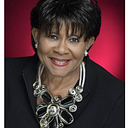Your Proactive Caregiver Advocate: Dr. Cynthia Speaks
Topic: Breast Cancer and Elders: Cancer, no Respect of Person!
October is breast cancer awareness month. We are all encouraged to learn about awareness and prevention. Guidelines can vary, but a mammogram should be done yearly, primarily if risk factors exist. Risk factors are anything that might increase the risk of the disease in your family, and genetics is a part of the risk factor. Advancing age is considered a risk factor as well. You may ask who is at risk for breast cancer. Well, I’m glad you asked! Men and women can get breast cancer. Cancer has no respect for a person. Men have breast tissue( similar to a girl’s breasts before puberty). Men can get the same type of cancer as women. The importance of screening cannot be taken lightly. It is critical to have annual preventive tests and screening.
I am sharing my personal story of breast cancer that affected my family. Both my sister and mother were diagnosed with breast cancer. My amazing sister is a breast cancer survivor of over ten years. My mother was diagnosed with breast cancer at 80 years old. We did annual mammograms, which is how her cancer was discovered. What was interesting is that no one in our immediate or distant family, maternal or paternal, had cancer. We all were perplexed. What we uncovered was that the mother, at age 55, went into early menopause and was placed on hormone replacement therapy(back in the day). When she moved to Texas at 77, with new doctors and a fresh look, she was taken off the medication. There has been research that links hormone replacement therapy to breast cancer. I am assuming my mother’s cancer was from the replacement therapy.
Diagnosing Breast Cancer
The same techniques used to diagnose breast cancer in women are used in men: physical exams, mammography, and biopsies. For self-examination, look for the lump in the breast or underarms, swelling or thickening of the breast, skin irritation or dimpling, pain in the breast, abnormal discharge, redness, or flaky skin in the breast area. As a caregiver, your loved one is counting on you to advocate for them, especially if they cannot do so. Stay on top of medical appointments.
As Your Proactive Caregiver Advocate, know that it’s possible to have breast cancer for years before symptoms begin. Remember that symptoms, like lumps and pain, can also be caused by other things. Be familiar with your loved one’s body so you’ll know if any changes occur. Be proactive! Be Safe! Be Well!
Dr. Cynthia J. Hickman is a retired registered nurse and case manager, CEO of Your Proactive Caregiver Advocate. She has released her newest book, The Essential Caregiver Training Course for Corporations and Community. From the Lens of Daughter, Nurse, and Caregiver: A Journey of Duty and Honor, and The Black Book of Important Information for Caregivers.
Website: www.cynthiajhickman.com
